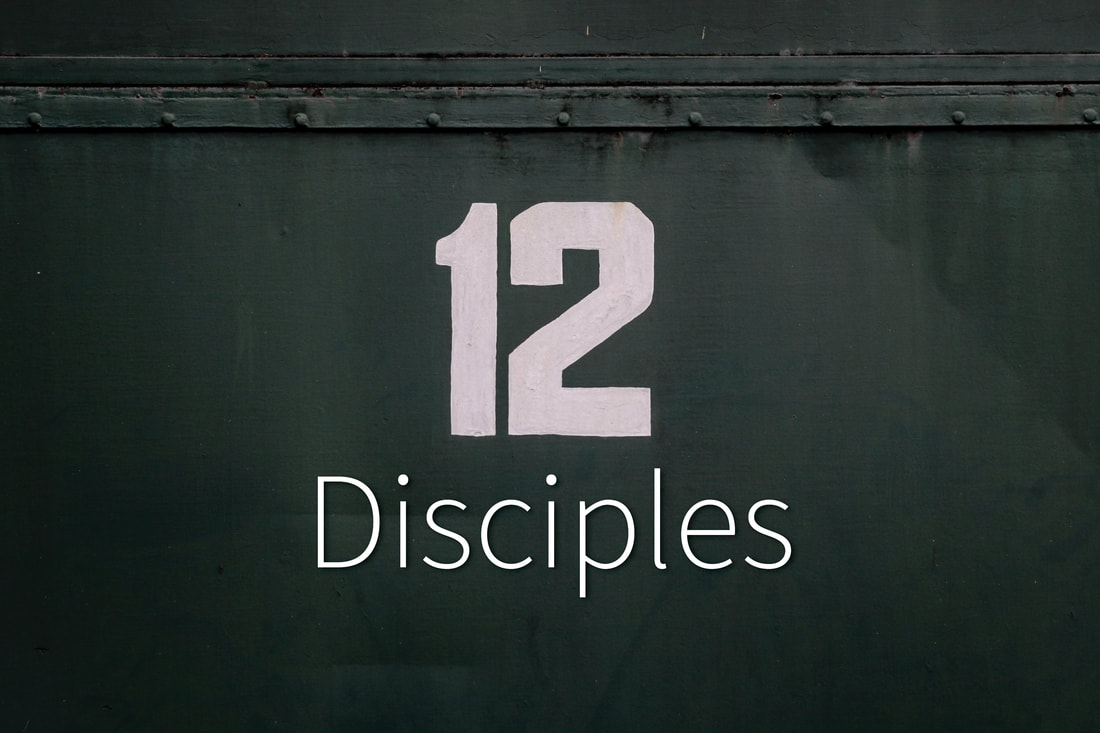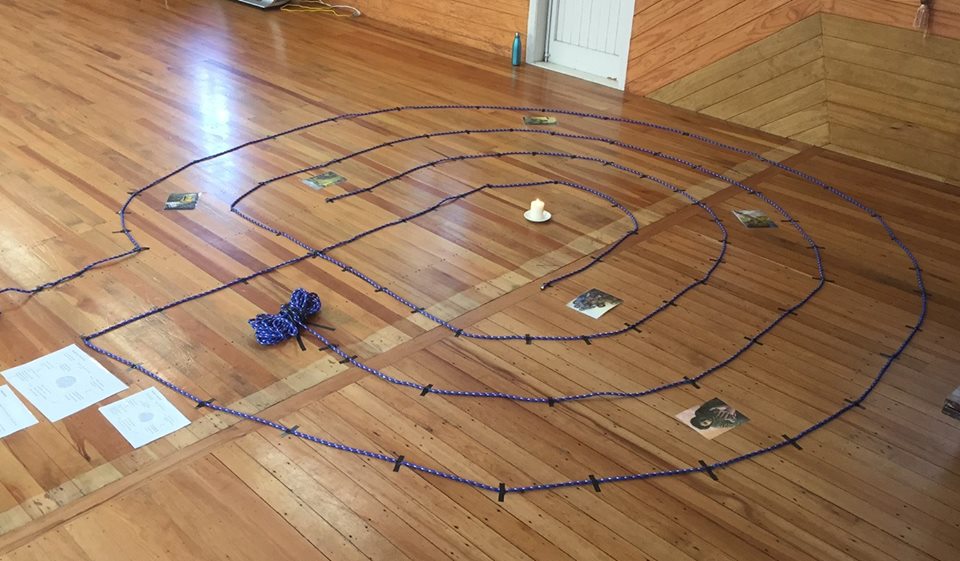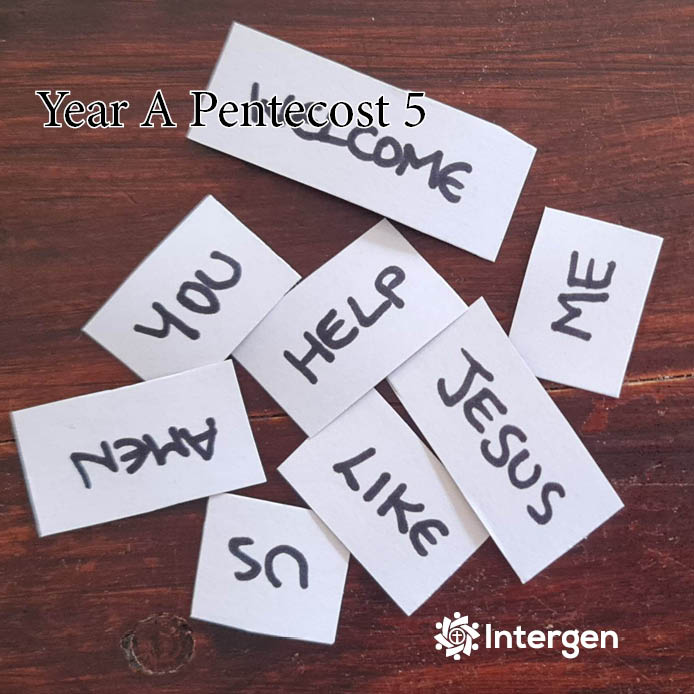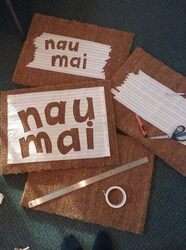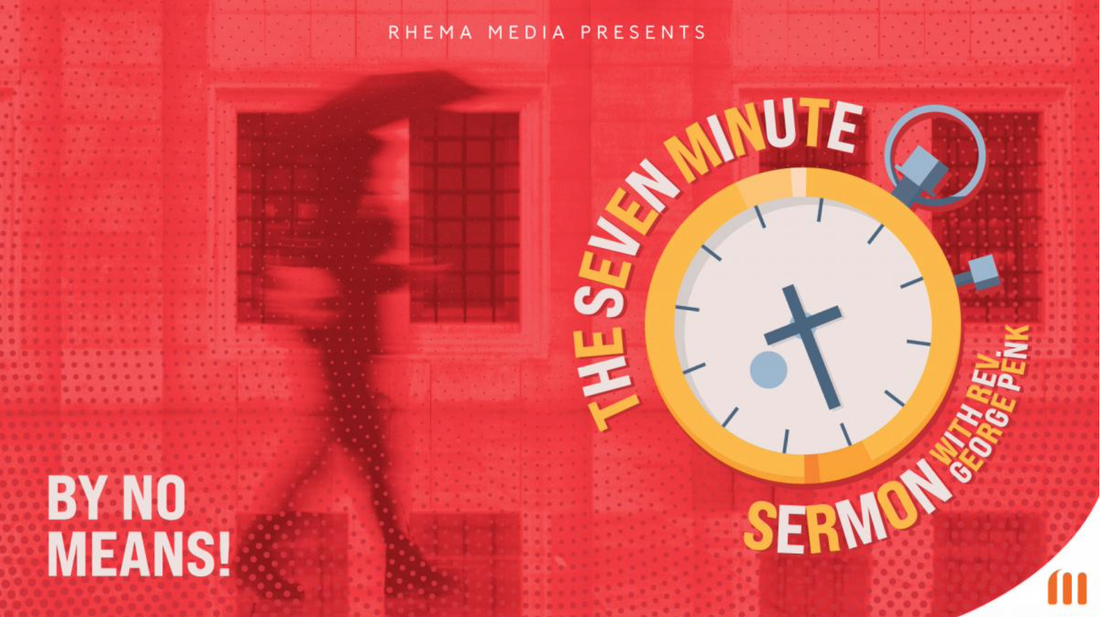Jesus sends out the 12 (Matthew 10:1-8)
About this passageThe disicples were Jesus' whānau, and they had already travelled with him on foot through Galilee. They had been there in the tough times, and had listened to him teach, share and encourage. They had watched him live by example, as the Son of God, walking and talking with him each day. And now it was their turn to go and try it alone. They still needed guidance, patience and tenderness as they trusted him to step out in faith, and he gave them the Holy Spirit to be with them.
Jesus sent his twelve harvest hands out with this charge: “Don’t begin by traveling to some far-off place to convert unbelievers. And don’t try to be dramatic by tackling some public enemy. Go to the lost, confused people right here in the neighborhood. Tell them that the kingdom is here. Bring health to the sick. Raise the dead. Touch the untouchables. Kick out the demons. You have been treated generously, so live generously." IntroductionMinistry-to-children.com have a good ice-breaker for today's passage. Read out the examples of things listed, and brainstorm whether they are to be done by the “Original Disciples” or “Disciples Living Now” e.g. cleanse lepers, work at the hospital, teach someone English, don't travel with a backpack, become a scientist.
Interactive Bible Stories
Gospel PlaneAn origami paper plane activity that helps unpack evangelism with children. Source and Instructions: Let the Little Children Come
Visio LectioA linocut print from Rev. Sarah West, from Visio Lectio - shared with permission
PNG Download Download w/ background Terms of Use |
Gospel ConversationsWe're getting well into "Ordinary Time" now and it's time to start thinking about what we DO in response to all we've remembered and celebrated throughout Easter and Pentecost. The harvest is plentiful, apparently! Join Jonathan, Esther and - for the first time - Wendy as they and Michael ponder together what it might mean for us, today, to be sent out to work the fields.
Discussion Questions
Dominoes object lessonAn object lesson using dominoes to share how one Christian kid telling their friend about Jesus can have ripples across the world. A good introduction to evangelism!
Memory gameThis game would work well with a small group of children. Ask a child to think about something they would take with them on a journey. Begin the sentence with "I'm going on a journey, and I need to take _______. The next person in the circle repeats this, and adds on their own item. "I"m going on a journey, and I need to take ____ and ____. Repeat around the circle.
|
Media
These videos are on the topic of the disciples of Jesus, which help provide context for this passage from the Gospel of Matthew
|
|
|
|
Do not be afraid (Matthew 10:24-39)
Jesus tells us not to worry, and to trust that Jesus is with us every day.
Visio LectioA print from Rev. Sarah West, from Visio Lectio, shared with permission.
PNG Download Download w/ background Terms of Use Rooftop questionsJesus words are both a challenge and a huge encouragement
Some questions to consider:
InterviewPreparation: Seek out one or two people from the congregation that have been Christians for a while and invite them to come to your children’s ministry for the morning to share what it has been like for them to be Christians. You may also like to have some questions written on bits of paper, and a gift for the guests as well as a card.
What to do: Get the children to sit in a circle and include the guests in that circle. Explain that today you have two special guests who have come to share about what it is like for them to be Christians. Introduce briefly the guests and include a couple of ‘interesting’ facts eg. The colour of their toothbrush, the name of a favourite pet, etc. Then, tell the children that going around the circle, each child will get the chance to ask a question of the guests. If they don’t know what to ask, get them to pick one out of the middle. If this works well, then end there. If it goes quickly for whatever reason, then invite the guests to share a little bit themselves. The key with this is to try and keep the children interested. So try getting the guests to talk about what they were like at school, if they ever did anything naughty at church, what they thought of church when they were young, why they believe in Jesus, etc. Prayer labyrinthsThis prayer resource was put together by Teri Johnson-Frow, from Johnsonville Anglicans, for their Ascension Sunday children's ministry. You could also use this prayer idea as you consider how we 'journey with Jesus.' She says:
This term we have been on a journey with the disciples, of knowing Jesus in a new way. This week we farewelled Jesus from his post-resurrection earthly ministry, when he returned to be with his Father. If we are followers of Jesus then we are always on a journey – a journey of following Jesus, of growing and changing in relationship with him, of being transformed individually and as a community. PRAYER LABYRINTHS This week in kids church we explored the idea of journey using prayer labyrinths. Most kids, and many adults, struggle to pray while sitting still and doing ‘nothing’. It can be easier to focus if fingers or bodies are engaged with something. Just think about the latest fidget spinner craze! Visual, kinetic and tactile forms of prayer (like labyrinths) can really help kids connect with God. Walking a labyrinth (or using a finger labyrinth) is also a great way to slow down from our busy lives and pay attention to God’s presence with us. If you or your kids are interested you might like to check out some larger outside labyrinths. There is a walking labyrinth at The Terrace Centre which is part of the Johnsonville Uniting Church on Dr Taylor Tce, Wellington. There is also one at Hutt Hospital. Both are free and open to the public. Try making your own finger labyrinths out of lego, cord, or clay. Or here are some easy printable ones http://flamecreativekids.blogspot.co.nz/…/finger-labyrinths… We also have some finger labyrinths at kids church you are welcome to borrow and try out. Labyrinths have been used by Christians as a spiritual practice for many centuries. They were originally used as a symbolic alternative to pilgrimage when the physical journey could not be undertaken. There is nothing mystical, magical or inherently transformative about labyrinths – they are simply a visual, tactile, and kinetic way of praying – much like taking a long walk, lighting a candle, writing in a journal, holding a cross or prayer beads, or many of the other tools we use to help ourselves notice God’s presence with us. May you be aware of God’s presence with you and your family this week. |
Gospel ConversationsThis Gospel passage is full of what are sometimes called "hard sayings" of Jesus, and yet it is also full of reassurances to not be afraid. How do we make sense of this challenging yet promise-laden set of instructions from Jesus to his brand-new disciples? Alec, Andrew and Anne join Michael to see if it's possible!
Do not worry, Rain for RootsA beautiful, simple song on Youtube by Rain for Roots.
This could be played in the background, taught to the children or used during a prayer time. Interview questionsInvite someone to come and talk to the children about what it is like to follow Jesus. You could choose a few different people, with different jobs, ages, and life stories.
Game - find the sparrows!What you need: lots of the sparrows provided in the template, blue tack, cd/tape player and background music
Preparation: Hide all the sparrows around the room using the blue tack to attach them. What to do: Tell the children that you are going to play some music, and that while it is playing they need to dance around to the music. When ever it stops, they need to try and find a sparrow. (Just one per child). Once they have all found one, the music will start again. Do this for a few rounds. Encourage the children to help others who are having trouble finding the sparrows.
Helping those who worryKids Can, a NZ charity, share that 254,000 children are growing up in hardship in New Zealand.
While our passage reminds us to trust God in all things and not to worry about our day to day needs, a quarter of our kiwi kids do not have the basics. Your church might have missional programmes in place, or charities/organisations that you support -- but perhaps today is a good day to ask the children how they can best share God's love with those who worry. Some questions to ask:
The worries of Aotearoa New ZealandYou can read the Salvation Army's State of the Nation 2023 report for more information about how we measuring up nationally, as we care for the last, lost and least.
Do not worry videoThis story is from Jesus teaching's on the sermon on the mount. He reminds us to not worry about anything because our heavenly father will take care of us like he takes care of the birds and the lilies. Although this video is from Matthew 625-34, it supports the teaching aim of today.
| ||||||
Welcome (Matthew 10:40-42)
Welcome questions"Anyone who welcomes you welcomes me. And anyone who welcomes me also welcomes the one who sent me"
Jesus talks about how important it is it welcome people -- and that when we are welcomed, or welcome others, Jesus is welcomed too.
Intergenerational worshipThis resource is the first of 5 weeks looking at how we can 'check our heart', using the upcoming gospel passages of Matthew. From Intergen Australia
Craft - welcome matsWhat you need:
What you do: Children work together to design and decorate the welcome mats. These can be used at church or given away to new people in the community, such a new refugee family. Have a template cut out in advance, with the letters for WELCOME or KIA ORA. Where a letter has a counter (e.g. the inside of an o) you might like to stick those down separately with masking tape. Secure the whole template to the mat with masking tape Doing one colour at at time, dip the paint brush into the test pot and dab it onto the mat, keeping the brush vertical. Complete one layer, and you might like to add another layer once that one is dry. You could do a different colour per letter. Give the mat to a new family in the area, or use them at church to welcome the community when they arrive. Game - welcome relayA fun, active game to help kids think about welcoming people well. You could do this as one group, or divide the children into teams
What you need:
What you do:
|
Gospel ConversationsThanks to the Diocese of Dunedin for their great Gospel Conversations each week. For some reason the lectionary, after giving us a long and complex reading last week, gives us 3 verses this week. What could we find worth spending time on in such a short passage? Bishop Kelvin, Nicki and Mark Wilson join Rev. Michael Godfrey to discover applications for our ministries, our relationships, and even the future of the church!
Visio LectioA Lino cut inspired image from Rev. Sarah West for this week's gospel reading, shared with permission.
PNG Download Download w/ background Terms of Use ManaakitangaManaakitanga means hospitality, kindness, generosity, support - the process of showing respect, generosity and care for others.
Strandz put together a video for the Wellington Diocese about Manaakitanga and Faith 5, introducing how we could invite Jesus to be a part of our meal times. Reward questions
Reward chart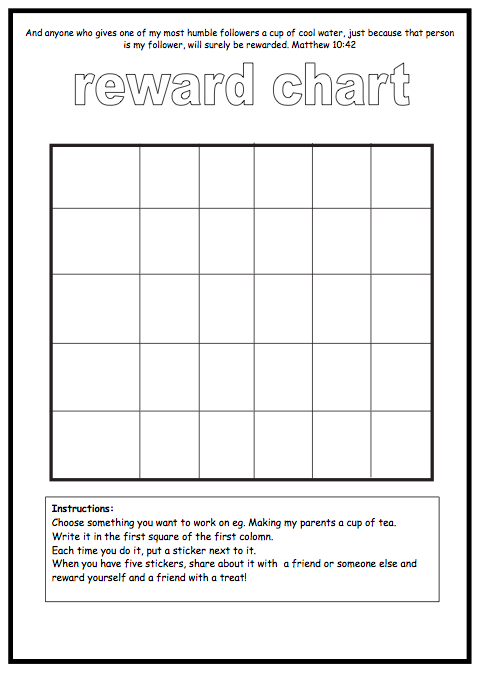
What you need: lots of stickers, a copy of the template, cardboard, stuff to decorate with, glue
What to do. Glue the template to the cardboard. Decorate. In the spaces provided, get the children to choose some things they would like to work on. Eg helping show hospitality, learning a particular bible verse off by heart, helping to clean up without being asked, praying before they go to bed, using kind words to welcome new children at school. Give each child some stickers. Explain that whenever they do one of the things they have listed, they can put a sticker next to it on the chart. When they have five stickers by an item, then the next time they come to Children’s Ministry, they can share about what they did, and what it was like or what they learned and they will get a special reward. (this might be a pencil or bookmark. The main point of this is to get them to share with the group about their experience and what they learned.)
Seven Minute SermonThis seven minute sermon podcast from Rev. George Penk looks Romans 6.14-23, and how grace makes Christianity unique. But does grace mean that we can keep sinning?
| ||||||

